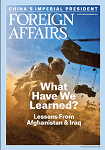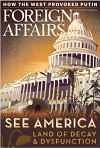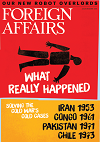Promises to Keep
The Millennium Development Goals are set to expire at the end of 2015. The time is near for world leaders to make some hard choices, to decide on new targets which will offer the greatest returns on investment
 Courtesy: Foreign Affairs
Courtesy: Foreign Affairs
The Millennium Development Goals are set to expire at the end of 2015. The time is near for world leaders to make some hard choices, to decide on new targets which will offer the greatest returns on investment
 Courtesy: Foreign Affairs
Courtesy: Foreign Affairs
Prime Minister Modi's prompt acceptance of President Obama's invitation to meet him in Washington shows his clear intent to jump-start India-U.S. relations which gives Obama a unique opportunity to reciprocate
 Courtesy: Foreign Affairs
Courtesy: Foreign Affairs
Why does politics now exercise so much influence over markets? The answer starts with the breakdown of economic growth models that relied on high commodity prices, low interest rates, and other global windfalls
 Courtesy: Foreign Affairs
Courtesy: Foreign Affairs
In the book, The Blood Telegram, the author Gary J. Bass puts the spotlight on the “significant complicity” of U.S. President Nixon and his national security adviser, Kissinger, in Bangladesh's "forgotten genocide"
 Courtesy: Foreign Affairs
Courtesy: Foreign Affairs
The U.S. is focusing on the Asia-Pacific region as part of its rebalancing strategy. However, it will not be able to sustain its leadership in the region through military might alone
 Courtesy: Foreign Affairs
Courtesy: Foreign Affairs
Many eastern European states who are part of the EU and were admitted only after being deemed compliant with the Copenhagen criteria have seen political parties in these countries become increasingly illiberal
 Courtesy: Foreign Affairs
Courtesy: Foreign Affairs
The U.S.'s energy boom will fuel the country’s economic revival and give it greater diplomatic freedom and influence. But it has geopolitical implications for countries across the world
 Courtesy: Foreign Affairs
Courtesy: Foreign Affairs
When the average growth rate in emerging markets hit over seven percent a year in the last decade, forecasters hyped its implications. Today, more than five years after the financial crisis of 2008, the euphoria seems to have waned